中西文化差异英文版.ppt
中西文化差异(英文版)ppt
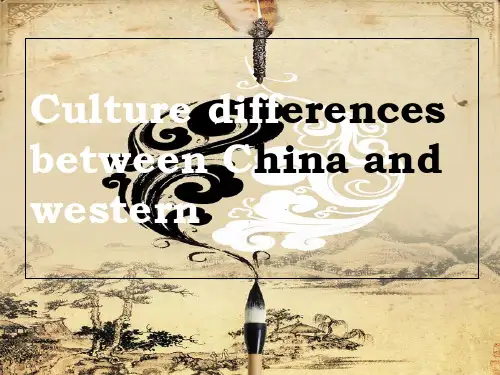
Differences in food
-
Chinese food and western food
In China, we prefer noodles, rice , dumpling as the main course.
We like cooking a lot of delicious dishes, then we set up the tables, put the dishes on the tables, sit together, and taste the dishes together, we don’t eat with individual plates, when we eating ,we like chatting and laughing, we think it’s warm and happy to eat this way;
• An western hostess is likely to say,” Oh, I am so glad that you liked it. I cook it especially for you.”
-
-
Differences in thinking -
-
-
-
-
-
THANKS
-
The standard of evaluating
-
Differences in living style
Chinese prefer getting up early and go to bed early too. We
usually go home early and cook meals, then we eat and watch TV, then we go to bed. We often work during the holidays , children often go to different spare schools to study. We like save money and when we have enough money, we then go and buy what we want, in my opinion, Chinese are so tired and busy;
东西方文化差异(英文) PPT
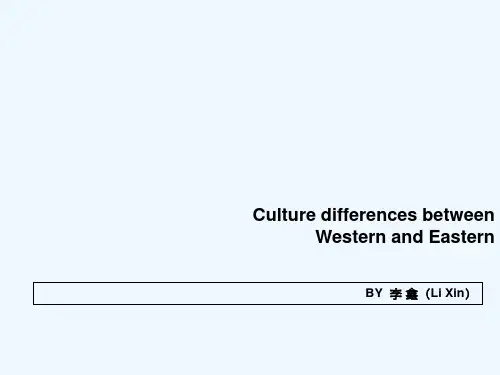
BY 李 鑫(Li Xin)
There exists many basic differences between Eastern and Western culture,such as time conscious,way of dealing with difficulties,human relations,lifestyles,diet habits and so on. 中外文化方面存在着很多本质的差异,比如时间观念、处理困难
The development of architecture:Chinese construction is Conservative ,and the west building often change their structure and materials rapidly.
Difference between Western and Eastern in wedding
SLAM DUNK (灌篮高手)(日本)
Detective Conan (名侦探柯南)(日本)
Tom and Jerry (猫和老鼠)(美国)
The Lion King(狮子王)(美国)
图示_03
Time Conscious(时间观念) In western,it is very punctual
图示_03
Queue up(排队) Westerns:order Chinese:disorder
图示_03
Leader position(领导地位) Westerners:equal Chinese:top
图示_03
The life of old age(晚年生活) Westerners:living with pets Chinese:living with children
中西文化差异(英语PPT)
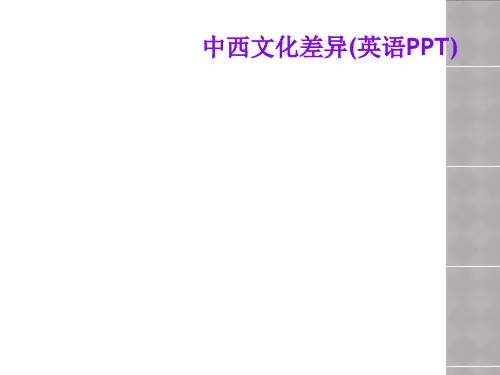
Leader is always
right!
2021/2/4
6
Realationship
After meeting,they need work with their fellow.
Western: Like the picture,it's really really simple.
China: On the contrary,ours is very very complex!To be honest,we have to say that relationship play an more important role than others in our life.
skill is important.
2021/2/4
9
The way to express anger
When they have conflict with their partner,and then they are unsatisfied with their partner.
Western: They will express what he think,even if to do like this might make others feel uncomfortable. China: We won't express our angry easily,because to do this will be regard as being rude.
together.
Western:
They will try their best
to found a method to
solve them.
中西文化差异(英文ppt)
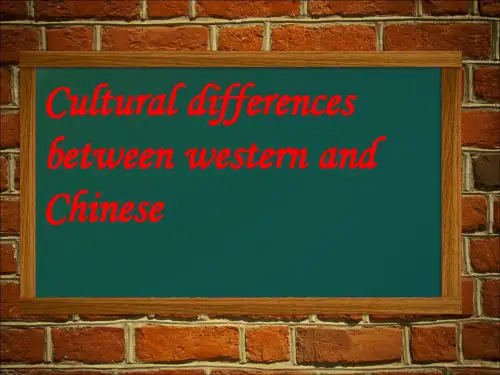
• SelfAwareness
• In the western countries, people always talk about individual rights, instead of placing the whole society above your own self.
• This is clearly different in China where a country, society or family are placed above your own self.
• Western education is more interesting .Teachers pay attentions to training students skills in thinking in realistic life not to emphasis on the importances of memories.
Differences in wedding
• In western countries the bride always in her white wedding gown and their wedding will be host in a church.
• In our China the bride and bridegroom would in red because we believe the red color reprsents lucky and the wedding would be host in the bridegroom’s house
Cultural differences between western and Chinese
中西文化差异英文PPT
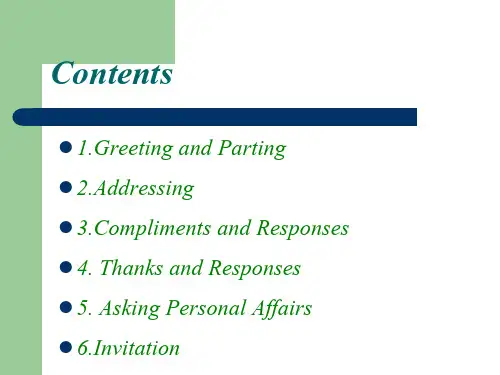
may be considered as ill mannered,
ill educated or rude.
equal”
pliments and Responses
For example, if a hostess is complimented for her cooking skill ,how will she response in west and china?
Contents
1.Greeting and Parting 2.Addressing pliments and Responses 4. Thanks and Responses 5. Asking Personal Affairs 6.Invitation
1.Greeting and Parting
…
Thank You!
Example 2: In the United States, a young Chinese woman, wearing a beautiful dress. When someone said to her "your dress is really elegant. The color is very beautiful". The young Chinese woman was very happy, but some embarrassed, as Chinese customs replied: "it is a common clothes, I bought in China".
Therefore they want to stay young because youth stands for hope and energy, they do not like to grow old because they will not gain honor, respect or attention as old people.
英文介绍中西文化差异 PPT
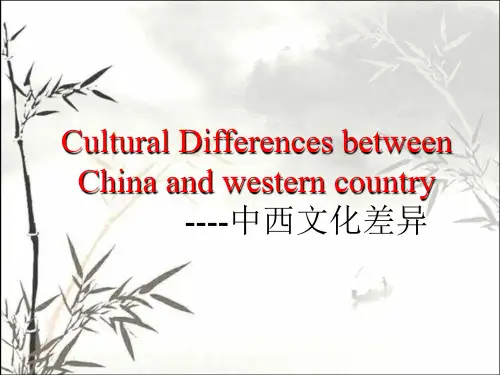
Etiquette culture (礼仪文化) --- Compliments and Response
(称赞与回答) Chinese: “modesty” (谦逊)
Westerner: “straight forwardness”(直白坦 率)
Etiquette culture (礼仪文化) --- Asking personal affairs when asking others personal affairs, eg: name、 age、marital status、wages、personal life.
Cultural Differences between China and western country ----中西文化差异
Contents (目录)
1、Food and tableware culture (餐桌文化)
2、Etiquette culture (礼仪文化)
3、Number and color (数字与颜色)
Joy (快乐) Peace (和平) Success (成功) In western country
Vigour (活力) Alert (警戒) Danger(危险)
White(白色)
In China
Death (死亡) Failure (失败) Decay (腐朽) Surrender (投降) In western country
( 国外结婚仪式)
华中农业大学
The wedding steps(婚礼步骤)
Wedding March(结婚进 行曲) Music stops (父亲引女入 堂并交予新郎) Wedding vow(誓言)
changing the rings(互换戒 指)
中西文化差异 英文ppt
• Chinese culture is older than 5000 years, and Chinese people have developed their own music, musical instruments, painting techniques, traditional Chinese medicine, and not to forget, cooking methods etc – completely different when compared to Western culture.
• In west countries, people like eating hamburgers, chips, pizza, pasta as their main course, they eat them with vegetable salad, they eat with drinking (water or juice),and they eat with separate plates.
Interpersonal • Chinese culture that
relationship
is based on humanism and
• Western culture is basedpoenople
science, which attempts to
resolve people and nature's
• But in most west countries, people live in a easy and happy lives. They get up late and go to work late too, they go to bars to have a rest after finishing their work.
中西医文化差异的英文PPT
中西医文化差异的英文PPTTitle: Cultural Differences between Traditional Chinese Medicine and Western Medicine - An English PPTIntroduction:Slide 1: Cultural Differences between Traditional Chinese Medicine and Western MedicineSlide 2: Traditional Chinese Medicine (TCM)Explanation of TCM: Traditional Chinese Medicine dates back thousands of years and is based on the belief in balancing the body's energy or "qi." It encompasses various techniques such as herbal medicine, acupuncture, and massage.Slide 3: Western MedicineExplanation of Western Medicine: Western medicine, also known as conventional medicine, is based on scientific research, diagnosis, and treatment. It primarily focuses on anatomical and physiological factors of diseases and utilizes pharmaceutical drugs, surgeries, and other modern interventions.Cultural Differences:Slide 4: Holistic vs. Reductionist ApproachExplanation: TCM takes a holistic approach by considering the body, mind, and spirit as interrelated elements. Western medicine, on the otherhand, adopts a reductionist approach by analyzing and treating specific symptoms or diseases.Slide 5: Yin-Yang and Qi vs. Anatomy and PhysiologyExplanation: TCM emphasizes the balance between Yin and Yang energies and the flow of Qi. Western medicine emphasizes the study of anatomy and physiology, focusing on the structure and function of organs and body systems.Slide 6: Individualized vs. Standardized TreatmentExplanation: TCM focuses on individualized treatment, considering each person's unique constitution and imbalances. Western medicine often relies on standardized treatment protocols based on scientific research and clinical trials.Slide 7: Natural vs. Synthetic SubstancesExplanation: TCM mainly utilizes natural substances such as herbs and plants for medicinal purposes. Western medicine relies heavily on synthetic drugs and chemical compounds.Slide 8: Prevention vs. CureExplanation: TCM emphasizes preventive measures to maintain overall health and balance. Western medicine often focuses on diagnosing and treating diseases after they have occurred.Impact on Healthcare:Slide 9: Integration of TCM and Western MedicineExplanation: In recent years, there has been a growing recognition of the benefits of integrating both TCM and Western medicine, particularly in countries like China. This includes complementary therapies where patients benefit from the strengths of both practices.Slide 10: Challenges and OpportunitiesExplanation: The integration of TCM and Western medicine presents both challenges and opportunities. These include the need for standardized research and evidence-based practice, cross-cultural communication, and mutual respect for both healthcare systems.Slide 11: Cultural CompetenceExplanation: Healthcare practitioners need to develop cultural competence to understand and respect patients' beliefs and preferences regarding treatment options. This ensures patient-centered care and better healthcare outcomes.Benefits of Cultural Exchange:Slide 12: Mutual Learning and UnderstandingExplanation: Exploring the cultural differences between TCM and Western medicine promotes mutual learning and understanding between different healthcare systems. This allows for the exchange of knowledge, techniques, and advancements.Slide 13: Enhanced Research and InnovationExplanation: Collaboration between TCM and Western medicine encourages research and innovation in both fields. Combined efforts canlead to the development of new treatment options and improved healthcare practices.Slide 14: Global Healthcare ImprovementExplanation: By embracing the cultural differences between TCM and Western medicine, it is possible to improve healthcare practices on a global scale. This can lead to better health outcomes, increased patient satisfaction, and reduced healthcare costs.Conclusion:Slide 15: Embracing Cultural Differences for Better HealthcareExplanation: The cultural differences between Traditional Chinese Medicine and Western medicine provide unique perspectives and approaches to healthcare. By embracing these differences, we can foster a more inclusive and comprehensive healthcare system that benefits individuals worldwide.Slide 16: Thank YouExplanation: Any questions or discussions are welcome.Note: This is a suggested outline for the PPT content. You can expand on each slide according to your preferences and add relevant visuals or illustrations to enhance the presentation.。
中西方语言文化差异英文PPT
In Chinese culture, praises and compliments have a wider range. It is the same with the American culture that for abilities and achievements, also other serious praise, only those people with the talent evaluation(称赞) ability can praise others. Older can praise young man, but this is only an encouragement, not really compliments on their abilities and achievements. Meanwhile, the younger can praise the older and the lower can praise the superior(地位高的), but this is just a compliment, and this is flattering(谄媚 的) more to those complimented. Therefore, in our daily life, we have a lot of praises for other people's abilities and achievements but they have different meanings on different occasions(场合), not only serious praises, but also a compliment to make the relationship closer.
中西文化差异(英语)ppt
However, in the western countries, the above questions are just questions, not greeting at all. They may think you’re inviting them to eat dinner if you ask about their meals. Usually, they’ll just give each other a smile or greet with a “Hi.”.
Chinese culture is based on masses (collectivism). People placed country and family above your own self.
Conception II
• Western culture is adventurous and exploration based. Westerners like to discover new things, invention and expand outwards. For instance, bungee jumping is considered adventurous and common in western am afraid I must be off, I have to …”
2.“Well, it’s been nice to see you again. I do enjoy
our
talk and the lovely dinner, but I must be going
Greeting is the first step to form culture
In China, if we meet a friend in the street, we are used to say: “Hi, have you had your meal?” or “Where are you going?”.
- 1、下载文档前请自行甄别文档内容的完整性,平台不提供额外的编辑、内容补充、找答案等附加服务。
- 2、"仅部分预览"的文档,不可在线预览部分如存在完整性等问题,可反馈申请退款(可完整预览的文档不适用该条件!)。
- 3、如文档侵犯您的权益,请联系客服反馈,我们会尽快为您处理(人工客服工作时间:9:00-18:30)。
culture is the biggest festival, food,
one.
wedding and so
on.Now I want to
introduce
something about
it.
Differences in Festival
Christmas Day
the Spring Festival
But in most west countries, people live in a easy and happy
lives. They get up late and go to work late too, they go to pubs, bars to have a rest after they finish their work, they enjoy their holidays, they seldom go to work during the weekend. if you go
• An western hostess is likely to say,” Oh, I am so glad that you liked it. I cook it especially for you.”
Differences in thinking
THANKS
பைடு நூலகம்
Differences in living style
Chinese prefer getting up early and go to bed early too. We
usually go home early and cook meals, then we eat and watch TV, then we go to bed. We often work during the holidays , children often go to different spare schools to study. We like save money and when we have enough money, we then go and buy what we want, in my opinion, Chinese are so tired and busy;
Differences in food
Chinese food and western food
In China, we prefer noodles, rice , dumpling as the main course.
We like cooking a lot of delicious dishes, then we set up the tables, put the dishes on the tables, sit together, and taste the dishes together, we don’t eat with individual plates, when we eating ,we like chatting and laughing, we think it’s warm and happy to eat this way;
to west countries, you can take part in their joyful night life.
East&West
• A Chinese hostess will apologize for giving you “Nothing”. She will say“I just made some dishes casually and they are not very tasty.”
But in England or other west countries, people like eating
hamburgers, chips, pizza, pasta as their main course, they eat them with vegetable salad, they eat with drinking (water or juice),and they eat with separate plates. In China, we become full up when we finish all the food, then we don’t eat anything, but in west countries, people eat desserts after they finish their meals.
Cooking skills
Differences in wedding
Differences in painting
Differences in education
Chinese education
Western education
Teaching style
The standard of evaluating
Culture differences between China and western
As we all know that
there are many
differences between
The culture
China and
includes many
Western,and I think the things,such as
